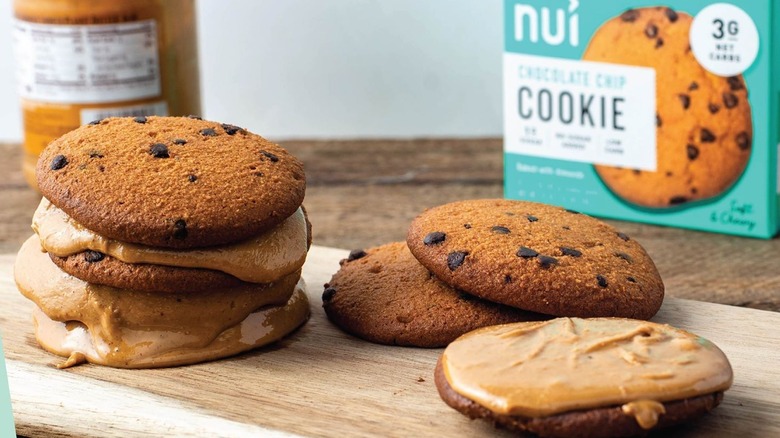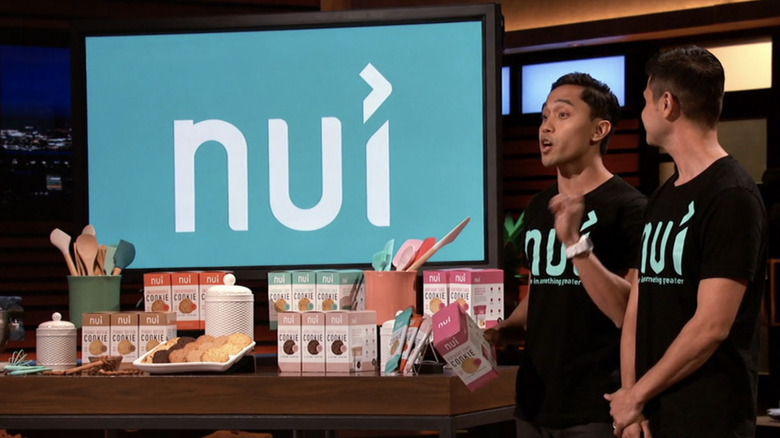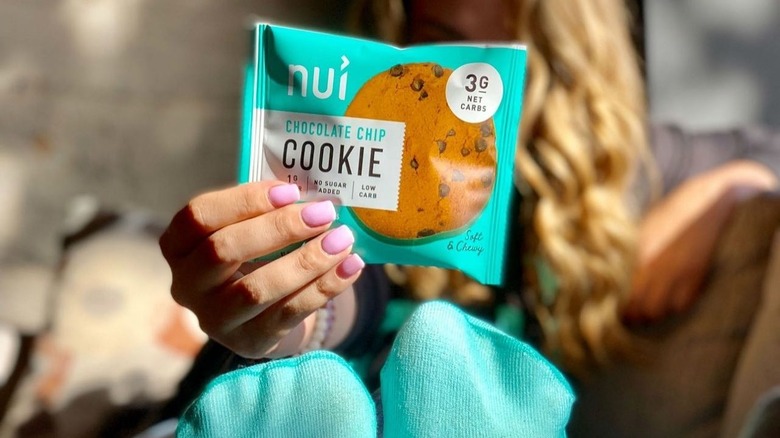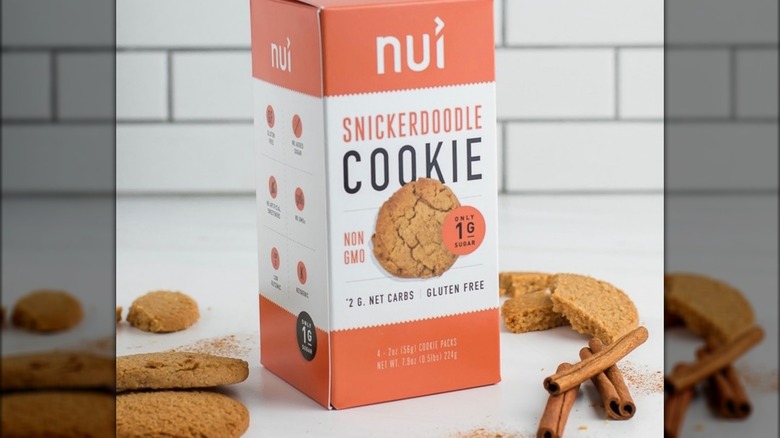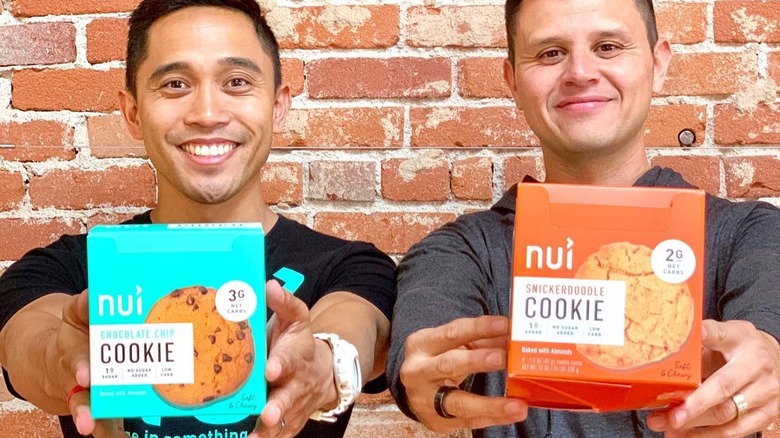Here's What Happened To Nui After Shark Tank
When you think of the basic foods that compose a ketogenic diet, you're probably likely to imagine giant ham legs, expensive beef sticks, and anything else that falls into the low-carb, high-fat category. Cookies are probably near the bottom of the list. Still, as it turns out, even ketoheads need a sweet treat now and then. That craving for something sweet inspired entrepreneurs Kristoffer Quiaoit and Victor Macias to create Nui. This keto-friendly cookie contains less than one gram of sugar per cookie. Despite the benefits the duo experienced by adopting the keto diet, they also dealt with unpleasant sugar cravings.After some experimenting in their home kitchen, they developed a low-sugar cookie recipe that relied on monkfruit rather than artificial sweeteners. The founders boasted that an entire box of Nui cookies contained less sugar than a single traditional cookie. They found success by marketing directly to keto diet followers and influencers on social media plus saw great success through their direct-to-consumer e-commerce website.
In season 10, episode 6 of "Shark Tank," Quiatoit and Macias came to the sharks to secure additional funds for their business, citing that they'd had a difficult time securing enough inventory to fulfill demand. The pair also wanted to partner with additional manufacturing and retail partners so they could transition into traditional retail spaces. With $1.1 million in sales over just 12 months, the Nui cookie creators made their case to the shark panel.
What happened to Nui on Shark Tank?
Quiatoit and Macias made their pitch to the sharks asking for $300,000 for 10% equity in the company. They began by providing some personal background and details about the cookies. After allowing the judges to sample the treats, the conversation veered into finances. Each box of cookies retailed for nearly $30, but the cost of production produced small profit margins which worried the judges. Still, the cookies got some bites. Three different sharks made offers for the company, including Kevin O'Leary, Barbara Corcoran, and guest judge Alex Rodriguez.
Marc Cuban bowed because of a conflict of interest, as he had already invested in another healthified cookie company. Lori Greiner opted out as well. O'Leary offered $300,000 on the condition of receiving $1 per sale until he recouped his initial investment, at which time the royalty would drop to $0.45. Barbara offered a similar deal at $150,000 upfront, a $150,000 credit line in exchange for a $ 0.50-lifetime royalty payout and 15% equity. Rodriguez stated that his then-partner (the couple has since separated) Jennifer Lopez loved a cookie before bed and was intrigued by the pair's background as first-generation immigrants to the United States. Rodriguez offered $300,000 for a whopping 25% stake in the company. After some deliberation, Quiatoit and Macias agreed to Rodriguez's deal as he stated that he'd be available to them as a significant partner in the company even though the other sharks warned against selling off so much equity.
Nui after Shark Tank
Sadly, even though a handshake agreement can seem like a happy ending on an episode of "Shark Tank," a number of these on-air deals fall through after the episode wraps. That seems to have been the case for Nui, as there's no indication that Rodriguez's offer ever became final. Still, many food companies don't get a Shark Tank deal and go on to be successful. Nui isn't one of those stories, though. In a LinkedIn post, Quiatoit wrote that after the episode aired in late 2018, they distributed massive orders of their cookies but they ran into a major issue and nightmare for a food company. Soon after the deliveries arrived, the company received numerous reports of moldy, inedible cookies. This led to extremely costly refunds and recalls as well as a loss of invaluable customer trust.
Quiatoit cited a lack of quality control once the cookie creation moved from a home kitchen to a co-manufacturer as behind the issue. He also stated that the company scraped together enough money to tweak the cookie recipe, which was well-received by customers, but this change was ultimately not enough to help the company get back in the black. The debt quickly became unmanageable, said Quiatoit, writing "Every day was Groundhog's Day. Wake up anxious, phone call from creditor, feel crappy, feel a burst of energy to figure a way out, reach out for investment, phone call from creditor, feel crappy, reach out for investment, go to bed anxious."
Is Nui still in business?
As of 2020, Nui shut down operations, seemingly without any official statement. The Instagram and Facebook accounts for the company suddenly ceased posting entirely and the website's address became defunct. Both Macias and Quiatoit filed for bankruptcy, according to statements released years after the fact on their website and LinkedIn page, respectively. Macias implied that the issues with the company extended beyond the recall issue, writing, "Our cost structure was all wrong (we were actually losing money on each order) ... We operated with a scarcity mentality and focused on surviving instead of thriving." So while the mold, refund, and recall issues were certainly damaging, it seems that there were always a few bumps in the business model.
The decision doesn't appear to have been taken lightly. Macias went on to say in his post, "We did everything we could to keep Nui alive, including not paying ourselves for 9 months, but in the end, we had to face reality. Nui wasn't going to make it." Just four years after its inception, Nui was no more.
What's next for Nui's founders?
Declaring bankruptcy can be a devastating life event for anyone, but thankfully, both Macias and Quiatoit seem to be on their feet professionally speaking. Macias describes himself as a "serial entrepreneur," and is currently listed as a present employee at five different companies, some in the retail space, and others as a startup consultant and business coach. Notably, Macias is the founder of another snack company called Santana Snacks which aims to replicate traditional Latinx snack flavors in a healthier product. Unfortunately, as of December 2023, the Kickstarter campaign for this venture was unsuccessful, so it remains to be seen if and when these snacks will be available for purchase.
Quiatoit also remains a part of the better-for-you snack world! However, he appears to have taken a different approach than Macias and has focused effort on one company as a founder. He co-founded Good Journey Foods in 2021, which offers low-sugar, low-carb cake donuts. The company currently only has two flavor offerings: chocolate and horchata, which are available through the website and select locations in Southern California.
